Related Research Articles

The Jolson Story is a 1946 American biographical musical film, a highly fictionalized account of the life of singer Al Jolson. It stars Larry Parks as Jolson, Evelyn Keyes as Julie Benson, William Demarest as his performing partner and manager, Ludwig Donath and Tamara Shayne as his parents, and Scotty Beckett as the young Jolson. Some of the film's episodes are based on fact but the story is extremely simplified, with people disguised or combined into single characters.
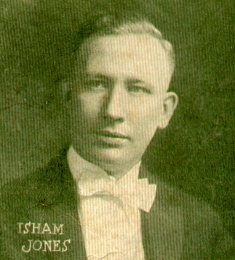
Isham Edgar Jones was an American bandleader, saxophonist, bassist and songwriter.
Pete Wendling was an American composer and pianist, born in New York City to German immigrants. He often collaborated with fellow QRS pianist and composer, Max Kortlander.
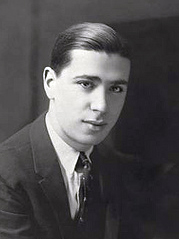
Sam Coslow was an American songwriter, singer, film producer, publisher and market analyst. Coslow was born in New York City. He began writing songs as a teenager. He contributed songs to Broadway revues, formed the music publishing company Spier and Coslow with Larry Spier and made a number of recordings as a performer.

"Back in Your Own Back Yard" is a popular song. Officially the credits show it as written by Al Jolson, Billy Rose, and Dave Dreyer; in fact, Billy Rose was exclusively a lyricist, Dreyer a composer, and Al Jolson a performer who was often given credits so he could earn some more money, so the actual apportionment of the credits would be likely to be music by Dreyer, lyrics by Rose, and possibly some small contribution by Jolson.

"Pretty Baby" is a song written by Tony Jackson during the Ragtime era. The song was remembered as being prominent in Jackson's repertory before he left New Orleans in 1912, but was not published until 1916.

"De Camptown Races" or "Gwine to Run All Night" is a folk song by American Romantic composer Stephen Foster. It was published in February 1850 by F. D. Benteen and was introduced to the American mainstream by Christy's Minstrels, eventually becoming one of the most popular folk/Americana tunes of the nineteenth century. It is Roud Folk Song Index no. 11768.
Harry Akst was an American songwriter, who started out his career as a pianist in vaudeville accompanying singers such as Nora Bayes, Frank Fay and Al Jolson.

"Swanee" is an American popular song written in 1919 by George Gershwin, with lyrics by Irving Caesar. It is most often associated with singer Al Jolson.
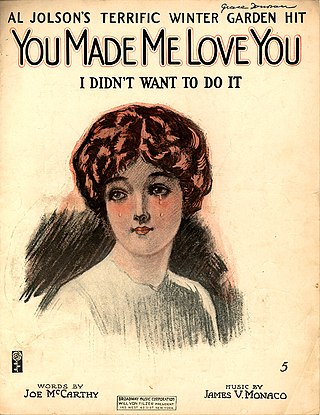
"You Made Me Love You (I Didn't Want to Do It)" is a popular song from 1913 composed by James V. Monaco with lyrics by Joseph McCarthy. It was introduced by Al Jolson in the Broadway revue The Honeymoon Express (1913), and used in the 1973 revival of the musical Irene.
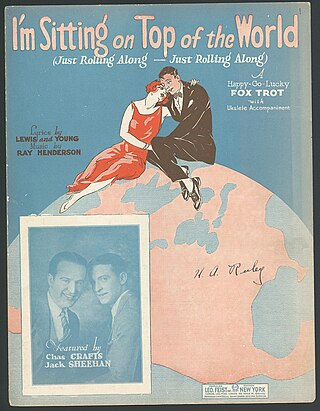
"I'm Sitting on Top of the World" is a popular song with music written by Ray Henderson and lyrics by Sam M. Lewis and Joe Young. It was published in 1925. This composition is not to be confused with, "Sitting on Top of the World" written by Walter Vinson and notably performed by Taj Mahal and Corey Harris.
Dave Dreyer was an American composer and pianist.
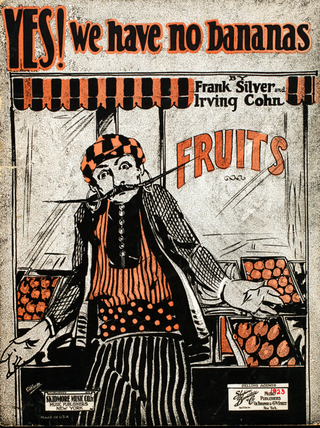
"Yes! We Have No Bananas" is an American novelty song by Frank Silver and Irving Cohn published March 23, 1923. It became a major hit in 1923 when it was recorded by Billy Jones, Billy Murray, Arthur Hall, Snoopy's Classiks on Toys, Irving Kaufman, and others. It was recorded later by Benny Goodman and His Orchestra, Spike Jones & His City Slickers, Louis Prima, Kidsongs, and many more.

"Rock-a-Bye Your Baby with a Dixie Melody" is a popular song written by Jean Schwartz, with lyrics by Sam M. Lewis and Joe Young. The song was introduced by Al Jolson in the Broadway musical Sinbad and published in 1918.
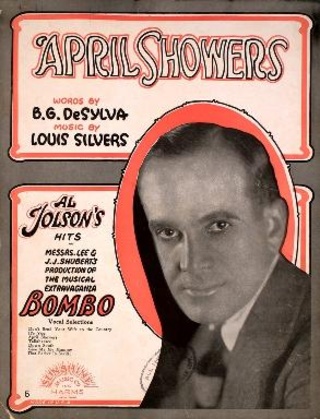
"April Showers" is a 1921 popular song composed by Louis Silvers with lyrics by B. G. De Sylva.
Juanita may refer to:
Harry MacGregor Woods was a Tin Pan Alley songwriter and pianist. He was a composer of numerous film scores.
Cliff Friend was an accomplished American songwriter and pianist. A member of Tin Pan Alley, Friend co-wrote several hits including "Lovesick Blues", "My Blackbirds Are Bluebirds Now" and "The Merry-Go-Round Broke Down", also known as the theme song to the Looney Tunes cartoon series.
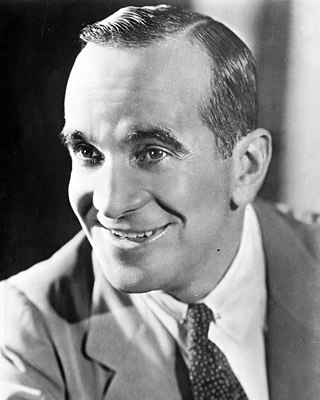
Al Jolson was a Lithuanian-born American singer, actor, and vaudevillian.

Toot, Toot, Tootsie is a 1922 song with music and lyrics by Gus Kahn, Ernie Erdman and Danny Russo, per the credits on the original sheet music cover. Some other sources also credit Ted Fio Rito and Robert King for the song, but make no mention of Dan Russo. It debuted in the Broadway musical Bombo, where it was a major hit. It was first recorded by Al Jolson with Frank Crumit's orchestra for Columbia Records on September 9, 1922. It was further popularised by the racy singer-comedian Eddie Cantor.
References
- ↑ "Columbia matrix 80762. Wanita / Al Jolson". Discography of American Historical Recordings. Retrieved 2024-10-30.
- ↑ "Wanita". Library of Congress, Washington, D.C. 20540 USA. Retrieved 2024-10-30.